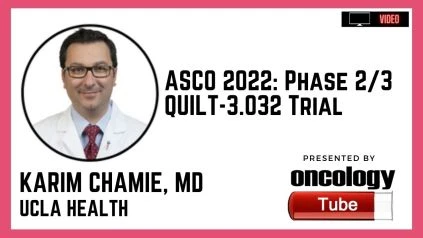Karim Chamie, MD, Associate Professor of Urology and Society of Urologic Oncology Fellowship Director at UCLA Health. In this video, he speaks about the ASCO 2022 Abstract – Final clinical results of pivotal trial of IL-15RαFc superagonist N-803 with BCG in BCG-unresponsive CIS and papillary nonmuscle-invasive bladder cancer (NMIBC).
Origins:
Patients with NMIBC CIS who are not responding to BCG have few therapeutic choices. N-803 (Anktiva) is a mutant IL-15-based immunostimulatory fusion protein complex (IL15RaFc) that increases natural killer (NK) cell proliferation and activation but not regulatory T cell activation. In BCG-naive patients with NMIBC, phase 1b findings show that intravesical treatment of N-803 with BCG induced full remission in all patients, with no recurrences over the 24-month study period. Pembrolizumab was licensed in 2020 after a single arm phase 2 trial of 96 patients yielded a 41 percent complete response (CR). We present findings from a 160-person open-label, three-cohort multicenter study (QUILT 3.032) of intravesical BCG with N-803 in patients with BCG-unresponsive high-grade NMIBC (NCT03022825).
Methodology:
In accordance with the normal induction/maintenance therapy regimen, all treated patients received intravesical N-803 plus BCG. Cohort A (CISprimary )’s outcome is the occurrence of CR of CIS at any time. Disease-free rate (DFS) at 12 months is the primary goal for Cohort B (Papillary).
Outcomes:
We have so far enrolled 160 patients (83 CIS, 77 Papillary). The whole population has a median age of 72.3 years, an 81 percent male population, and a mean number of past TURBTs of 4. The average number of past BCG injections was 12. CIS patients had a CR rate of 71% (59/83), with a median duration of CR of 24.1 months in responders; 91% avoided cystectomy, and 96% had 24 month bladder cancer specific progression free survival (defined as progression to MIBC). Papillary patients had a DFS incidence of 57 percent at 12 months, 48 percent at 24 months, and 95 percent avoided cystectomy. The median time to cystectomy in responders (N = 4) is 12.9 months compared to 7.8 months in non-responders (N = 8), representing a 5.1 month delay in cystectomy. N-803 action is restricted to the bladder, according to PK data. Low grade treatment-related AEs (grade 1-2) include dysuria (22%), pollakiurua (19%), hematuria (18%), weariness (16%), and urgency (12%); all other AEs were reported at 7% or less. There were no treatment-related grade 4 or 5 adverse events. There were no SAEs that were deemed treatment-related. There have been no immune-related SAEs seen.
Observations:
At 2 years, there is a 99 percent bladder cancer specific overall survival in 160 patients with BCG-unresponsive NMIBC. In CIS patients, the CR rate was 71%, with a median duration of response of 24.1 months, while the DFS rate was 53% at 18 months. With a two-year follow-up, more than 90% of patients avoided cystectomy. N-803+BCG outperforms other current intravesical and systemic alternatives for BCG-unresponsive NMIBC in terms of efficacy and safety. NCT03022825 is the clinical trial number.

